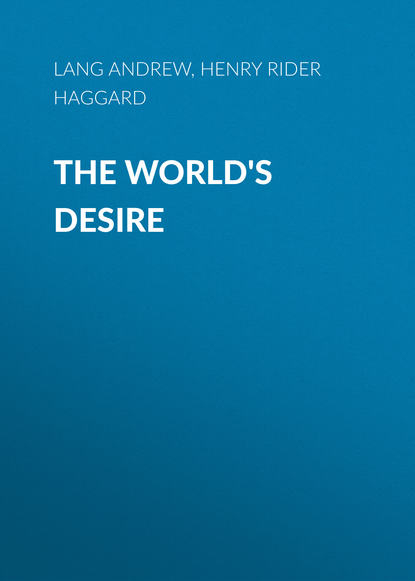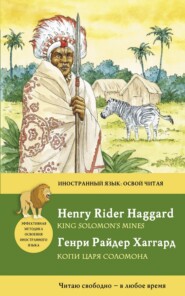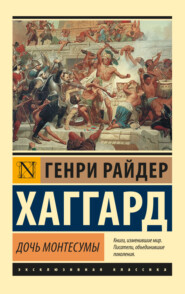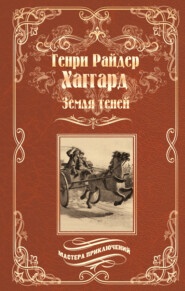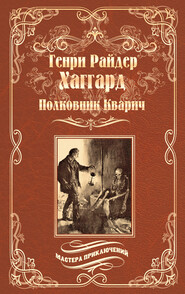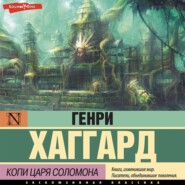По всем вопросам обращайтесь на: info@litportal.ru
(©) 2003-2024.
✖
The World's Desire
Настройки чтения
Размер шрифта
Высота строк
Поля
“The face of Odysseus of Ithaca it was that I saw before me, Lady, and that face is mine. I avow myself to be Odysseus, Laertes’ son, and no other man.”
The Queen laughed aloud. “Great must be my strength of magic,” she said, “for it can strip the guile from the subtlest of men. Henceforth, Odysseus, thou wilt know that the eyes of Meriamun the Queen see far. Now tell me truly: what camest thou hither to seek?”
The Wanderer took swift counsel with himself. Remembering that dream of Meriamun of which Rei the Priest had told him, and which she knew not that he had learned, the dream that showed her the vision of one whom she must love, and remembering the word of the dead Hataska, he grew afraid. For he saw well by the token of the spear point that he was the man of her dream, and that she knew it. But he could not accept her love, both because of his oath to Pharaoh and because of her whom Aphrodite had shown to him in Ithaca, her whom alone he must seek, the Heart’s Desire, the Golden Helen.
The strait was desperate, between a broken oath and a woman scorned. But he feared his oath, and the anger of Zeus, the God of hosts and guests. So he sought safety beneath the wings of truth.
“Lady,” he said, “I will tell thee all! I came to Ithaca from the white north, where a curse had driven me; I came and found my halls desolate, and my people dead, and the very ashes of my wife. But in a dream of the night I saw the Goddess whom I have worshipped little, Aphrodite of Idalia, whom in this land ye name Hathor, and she bade me go forth and do her will. And for reward she promised me that I should find one who waited me to be my deathless love.”
Meriamun heard him so far, but no further, for of this she made sure, that she was the woman whom Aphrodite had promised to the Wanderer. Ere he might speak another word she glided to him like a snake, and like a snake curled herself about him. Then she spoke so low that he rather knew her thought than heard her words:
“Was it indeed so, Odysseus? Did the Goddess indeed send thee to seek me out? Know, then, that not to thee alone did she speak. I also looked for thee. I also waited the coming of one whom I should love. Oh, heavy have been the days, and empty was my heart, and sorely through the years have I longed for him who should be brought to me. And now at length it is done, now at length I see him whom in my dream I saw,” and she lifted her lips to the lips of the Wanderer, and her heart, and her eyes, and her lips said “Love.”
But it was not for nothing that he bore a stout and patient heart, and a brain unclouded by danger or by love. He had never been in a strait like this; caught with bonds that no sword could cut, and in toils that no skill could undo. On one side were love and pleasure – on the other a broken oath, and the loss for ever of the Heart’s Desire. For to love another woman, as he had been warned, was to lose Helen. But again, if he scorned the Queen – nay, for all his hardihood he dared not tell her that she was not the woman of his vision, the woman he came to seek. Yet even now his cold courage and his cunning did not fail him.
“Lady,” he said, “we both have dreamed. But if thou didst dream thou wert my love, thou didst wake to find thyself the wife of Pharaoh. And Pharaoh is my host and hath my oath.”
“I woke to find myself the wife of Pharaoh,” she echoed, wearily, and her arms uncurled from his neck and she sank back on the couch. “I am Pharaoh’s wife in word, but not in deed. Pharaoh is nothing to me, thou Wanderer – nought save a name.”
“Yet is my oath much to me, Queen Meriamun – my oath and the hospitable hearth,” the Wanderer made answer. “I swore to Meneptah to hold thee from all ill, and there’s an end.”
“And if Pharaoh comes back no more, what then Odysseus?”
“Then will we talk again. And now, Lady, thy safety calls me to visit thy Guard.” And without more words he rose and went.
The Queen looked after him.
“A strange man,” she said in her heart, “who builds a barrier with his oath betwixt himself and her he loves and has wandered so far to win! Yet methinks I honour him the more. Pharaoh Meneptah, my husband, eat, drink, and be merry, for this I promise thee – short shall be thy days.”
V THE CHAPEL PERILOUS
“Swift as a bird or a thought,” says the old harper of the Northern Sea. The Wanderer’s thoughts in the morning were swift as night birds, flying back and brooding over the things he had seen and the words he had heard in the Queen’s chamber. Again he stood between this woman and the oath which, of all oaths, was the worst to break. And, indeed, he was little tempted to break it, for though Meriamun was beautiful and wise, he feared her love and he feared her magic art no less than he feared her vengeance if she were scorned. Delay seemed the only course. Let him wait till the King returned, and it would go hard but he found some cause for leaving the city of Tanis, and seeking through new adventures the World’s Desire. The mysterious river lay yonder. He would ascend the river of which so many tales were told. It flowed from the land of the blameless Æthiopians, the most just of men, at whose tables the very Gods sat as guests. There, perchance, far up the sacred stream, in a land where no wrong ever came, there, if the Fates permitted, he might find the Golden Helen.
If the Fates permitted: but all the adventure was of the Fates, who had shown him to Meriamun in a dream.
He turned it long in his mind and found little light. It seemed that as he had drifted through darkness across a blood-red sea to the shores of Khem, so he should wade through blood to that shore of Fate which the Gods appointed.
Yet after a while he shook sorrow from him, arose, bathed, anointed himself, combed his dark locks, and girded on his golden armour. For now he remembered that this was the day when the Strange Hathor should stand upon the pylon of the temple and call the people to her, and he was minded to look upon her, and if need be to do battle with that which guarded her.
So he prayed to Aphrodite that she would help him, and he poured out wine to her and waited; he waited, but no answer came to his prayer. Yet as he turned away it chanced that he saw his countenance in the wide golden cup whence he had poured, and it seemed to him that it had grown more fair and lost the stamp of years, and that his face was smooth and young as the face of that Odysseus who, many years ago, had sailed in the black ships and looked back on the smoking ruins of windy Troy. In this he saw the hand of the Goddess, and knew that if she might not be manifest in this land of strange Gods, yet she was with him. And, knowing this, his heart grew light as the heart of a boy from whom sorrow is yet a long way off, and who has not dreamed of death.
Then he ate and drank, and when he had put from him the desire of food he arose and girded on the sword, Euryalus’s gift, but the black bow he left in its case. Now he was ready and about to set forth when Rei the Priest entered the chamber.
“Whither goest thou, Eperitus?” asked Rei, the instructed Priest. “And what is it that has made thy face so fair, as though many years had been lifted from thy back?”
“‘Tis but sweet sleep, Rei,” said the Wanderer. “Deeply I slept last night, and the weariness of my wanderings fell from me, and now I am as I was before I sailed across the blood-red sea into the night.”
“Sell thou the secret of this sleep to the ladies of Khem,” answered the aged priest, smiling, “and little shalt thou lack of wealth for all thy days.”
Thus he spake as though he believed the Wanderer, but in his heart he knew that the thing was of the Gods.
The Wanderer answered:
“I go up to the Temple of the Hathor, for thou dost remember it is to-day that she stands upon the pylon brow and calls the people to her. Comest thou also, Rei?”
“Nay, nay, I come not, Eperitus. I am old indeed, but yet the blood creeps through these withered veins, and, perchance, if I came and looked, the madness would seize me also, and I too should rush to my slaying. There is a way in which a man may listen to the voice of the Hathor, and that is to have his eyes blindfolded, as many do. But even then he will tear the bandage from his eyes, and look, and die with the others. Oh, go not up, Eperitus – I pray thee go not up. I love thee – I know not why – and am little minded to see thee dead. Though, perchance,” he added, as though to himself, “it would be well for those I serve if thou wert dead, thou Wanderer, with the eyes of Fate.”
“Have no fear, Rei,” said the Wanderer, “as it is doomed so shall I die and not otherwise. Never shall it be told,” he murmured in his heart, “that he who stood in arms against Scylla, the Horror of the Rock, turned back from any form of fear or from any shape of Love.”
Then Rei wrung his hands and went nigh to weeping, for to him it seemed a pitiful thing that so goodly a man and so great a hero should thus be done to death. But the Wanderer passed out through the city, and Rei went with him for a certain distance. At length they came to the road set on either side with sphinxes, that leads from the outer wall of brick to the garden of the Temple of Hathor, and down this road hurried a multitude of men of all races and of every age. Here the prince was borne along in his litter; here the young noble travelled in his chariot. Here came the slave bespattered with the mud of the fields; here the cripple limped upon his crutches; and here was the blind man led by a hound. And with each man came women: the wife of the man, or his mother, or his sisters, or she to whom he was vowed in marriage. Weeping they came, and with soft words and clinging arms they strove to hold back him whom they loved.
“Oh, my son! my son!” cried a woman, “hearken to thy mother’s voice. Go not up to look upon the Goddess, for if thou dost look then shalt thou die, and thou alone art left alive to me. Two brothers of thine I bore, and behold, both are dead; and wilt thou die also, and leave me, who am old, alone and desolate? Be not mad, my son, thou art the dearest of all; ever have I loved thee and tended thee. Come back, I pray – come back.”
But her son heard not and heeded not, pressing on toward the Gates of the Heart’s Desire.
“Oh, my husband, my husband!” cried another, young, of gentle birth, and fair, who bare a babe on her left arm and with the right clutched her lord’s broidered robe. “Oh, my husband, have I not loved thee and been kind to thee, and wilt thou still go up to look upon the deadly glory of the Hathor? They say she wears the beauty of the Dead. Lovest thou me not better than her who died five years agone, Merisa the daughter of Rois, though thou didst love her first? See, here is thy babe, thy babe, but one week born. Even from my bed of pain have I risen and followed after thee down these weary roads, and I am like to lose my life for it. Here is thy babe, let it plead with thee. Let me die if so it must be, but go not thou up to thy death. It is no Goddess whom thou wilt see, but an evil spirit loosed from the under-world, and that shall be thy doom. Oh, if I please thee not, take thou another wife and I will make her welcome, only go not up to thy death!”
But the man fixed his eyes upon the pylon tops, heeding her not, and at length she sank upon the road, and there with the babe would have been crushed by the chariots, had not the Wanderer borne her to one side of the way.
Now, of all sights this was the most dreadful, for on every side rose the prayers and lamentations of women, and still the multitude of men pressed on unheeding.
“Now thou seest the power of Love, and how if a woman be but beautiful enough she may drag all men to ruin,” said Rei the Priest.
“Yes,” said the Wanderer; “a strange sight, truly. Much blood hath this Hathor of thine upon her hands.”
“And yet thou wilt give her thine, Wanderer.”
“That I am not minded to do,” he answered; “yet I will look upon her face, so speak no more of it.”
Now they were come to the space before the bronze gates of the pylon of the outer court, and there the multitude gathered to the number of many hundreds. Presently, as they watched, a priest came to the gates, that same priest who had shown the Wanderer the bodies in the baths of bronze. He looked through the bars and cried aloud:
“Whoso would enter into the court and look upon the Holy Hathor let him draw nigh. Know ye this, all men, the Hathor is to him who can win her. But if he pass not, then shall he die and be buried within the temple, nor shall he ever look upon the sun again. Of this ye are warned. Since the Hathor came again to Khem, of men seven hundred and three have gone to win her, and of bodies seven hundred and two lie within the vaults, for of all these men Pharaoh Meneptah alone hath gone back living. Yet there is place for more! Enter, ye who would look upon the Hathor!”
Now there arose a mighty wailing from the women. They clung madly about the necks of those who were dear to them, and some clung not in vain. For the hearts of many failed them at the last, and they shrank from entering in. But a few of those who had already looked upon the Hathor from afar, perchance a score in all, struck the women from them and rushed up to the gates.
“Surely thou wilt not enter in?” quoth Rei, clinging to the arm of the Wanderer. “Oh, turn thy back on death and come back with me. I pray thee turn.”
“Nay,” said the Wanderer, “I will go in.”
Then Rei the Priest threw dust upon his head, wept aloud, and turned and fled, never stopping till he came to the Palace, where sat Meriamun the Queen.
Now the priest unbarred a wicket in the gates of bronze, and one by one those who were stricken of the madness entered in. For all of these had seen the Hathor many times from afar without the wall, and now they could no more withstand their longing. And as they entered two other priests took them by the hand and bound their eyes with cloths, so that unless they willed it they might not see the glory of the Hathor, but only hear the sweetness of her voice. But two there were who would not be blindfolded, and of these one was that man whose wife had fainted by the way, and the other was a man sightless from his youth. For although he might not see the beauty of the Goddess, this man was made mad by the sweetness of her voice. Now, when all had entered in, save the Wanderer, there was a stir in the crowd, and a man rushed up. He was travel-stained, he had a black beard, black eyes, and a nose hooked like a vulture’s beak.
“Hold!” he cried. “Hold! Shut not the gates! Night and day have I journeyed from the host of the Apura who fly into the wilderness. Night and day have I journeyed, leaving wife and flocks and children and the Promise of the Land, that I may once more look upon the beauty of the Hathor. Shut not the gates!”
“Pass in,” said the priest, “pass in, so shall we be rid of one of those whom Khem nurtured up to rob her.”
He entered; then, as the priest was about to bar the wicket, the Wanderer strode forward, and his golden armour clashed beneath the portal.
The Queen laughed aloud. “Great must be my strength of magic,” she said, “for it can strip the guile from the subtlest of men. Henceforth, Odysseus, thou wilt know that the eyes of Meriamun the Queen see far. Now tell me truly: what camest thou hither to seek?”
The Wanderer took swift counsel with himself. Remembering that dream of Meriamun of which Rei the Priest had told him, and which she knew not that he had learned, the dream that showed her the vision of one whom she must love, and remembering the word of the dead Hataska, he grew afraid. For he saw well by the token of the spear point that he was the man of her dream, and that she knew it. But he could not accept her love, both because of his oath to Pharaoh and because of her whom Aphrodite had shown to him in Ithaca, her whom alone he must seek, the Heart’s Desire, the Golden Helen.
The strait was desperate, between a broken oath and a woman scorned. But he feared his oath, and the anger of Zeus, the God of hosts and guests. So he sought safety beneath the wings of truth.
“Lady,” he said, “I will tell thee all! I came to Ithaca from the white north, where a curse had driven me; I came and found my halls desolate, and my people dead, and the very ashes of my wife. But in a dream of the night I saw the Goddess whom I have worshipped little, Aphrodite of Idalia, whom in this land ye name Hathor, and she bade me go forth and do her will. And for reward she promised me that I should find one who waited me to be my deathless love.”
Meriamun heard him so far, but no further, for of this she made sure, that she was the woman whom Aphrodite had promised to the Wanderer. Ere he might speak another word she glided to him like a snake, and like a snake curled herself about him. Then she spoke so low that he rather knew her thought than heard her words:
“Was it indeed so, Odysseus? Did the Goddess indeed send thee to seek me out? Know, then, that not to thee alone did she speak. I also looked for thee. I also waited the coming of one whom I should love. Oh, heavy have been the days, and empty was my heart, and sorely through the years have I longed for him who should be brought to me. And now at length it is done, now at length I see him whom in my dream I saw,” and she lifted her lips to the lips of the Wanderer, and her heart, and her eyes, and her lips said “Love.”
But it was not for nothing that he bore a stout and patient heart, and a brain unclouded by danger or by love. He had never been in a strait like this; caught with bonds that no sword could cut, and in toils that no skill could undo. On one side were love and pleasure – on the other a broken oath, and the loss for ever of the Heart’s Desire. For to love another woman, as he had been warned, was to lose Helen. But again, if he scorned the Queen – nay, for all his hardihood he dared not tell her that she was not the woman of his vision, the woman he came to seek. Yet even now his cold courage and his cunning did not fail him.
“Lady,” he said, “we both have dreamed. But if thou didst dream thou wert my love, thou didst wake to find thyself the wife of Pharaoh. And Pharaoh is my host and hath my oath.”
“I woke to find myself the wife of Pharaoh,” she echoed, wearily, and her arms uncurled from his neck and she sank back on the couch. “I am Pharaoh’s wife in word, but not in deed. Pharaoh is nothing to me, thou Wanderer – nought save a name.”
“Yet is my oath much to me, Queen Meriamun – my oath and the hospitable hearth,” the Wanderer made answer. “I swore to Meneptah to hold thee from all ill, and there’s an end.”
“And if Pharaoh comes back no more, what then Odysseus?”
“Then will we talk again. And now, Lady, thy safety calls me to visit thy Guard.” And without more words he rose and went.
The Queen looked after him.
“A strange man,” she said in her heart, “who builds a barrier with his oath betwixt himself and her he loves and has wandered so far to win! Yet methinks I honour him the more. Pharaoh Meneptah, my husband, eat, drink, and be merry, for this I promise thee – short shall be thy days.”
V THE CHAPEL PERILOUS
“Swift as a bird or a thought,” says the old harper of the Northern Sea. The Wanderer’s thoughts in the morning were swift as night birds, flying back and brooding over the things he had seen and the words he had heard in the Queen’s chamber. Again he stood between this woman and the oath which, of all oaths, was the worst to break. And, indeed, he was little tempted to break it, for though Meriamun was beautiful and wise, he feared her love and he feared her magic art no less than he feared her vengeance if she were scorned. Delay seemed the only course. Let him wait till the King returned, and it would go hard but he found some cause for leaving the city of Tanis, and seeking through new adventures the World’s Desire. The mysterious river lay yonder. He would ascend the river of which so many tales were told. It flowed from the land of the blameless Æthiopians, the most just of men, at whose tables the very Gods sat as guests. There, perchance, far up the sacred stream, in a land where no wrong ever came, there, if the Fates permitted, he might find the Golden Helen.
If the Fates permitted: but all the adventure was of the Fates, who had shown him to Meriamun in a dream.
He turned it long in his mind and found little light. It seemed that as he had drifted through darkness across a blood-red sea to the shores of Khem, so he should wade through blood to that shore of Fate which the Gods appointed.
Yet after a while he shook sorrow from him, arose, bathed, anointed himself, combed his dark locks, and girded on his golden armour. For now he remembered that this was the day when the Strange Hathor should stand upon the pylon of the temple and call the people to her, and he was minded to look upon her, and if need be to do battle with that which guarded her.
So he prayed to Aphrodite that she would help him, and he poured out wine to her and waited; he waited, but no answer came to his prayer. Yet as he turned away it chanced that he saw his countenance in the wide golden cup whence he had poured, and it seemed to him that it had grown more fair and lost the stamp of years, and that his face was smooth and young as the face of that Odysseus who, many years ago, had sailed in the black ships and looked back on the smoking ruins of windy Troy. In this he saw the hand of the Goddess, and knew that if she might not be manifest in this land of strange Gods, yet she was with him. And, knowing this, his heart grew light as the heart of a boy from whom sorrow is yet a long way off, and who has not dreamed of death.
Then he ate and drank, and when he had put from him the desire of food he arose and girded on the sword, Euryalus’s gift, but the black bow he left in its case. Now he was ready and about to set forth when Rei the Priest entered the chamber.
“Whither goest thou, Eperitus?” asked Rei, the instructed Priest. “And what is it that has made thy face so fair, as though many years had been lifted from thy back?”
“‘Tis but sweet sleep, Rei,” said the Wanderer. “Deeply I slept last night, and the weariness of my wanderings fell from me, and now I am as I was before I sailed across the blood-red sea into the night.”
“Sell thou the secret of this sleep to the ladies of Khem,” answered the aged priest, smiling, “and little shalt thou lack of wealth for all thy days.”
Thus he spake as though he believed the Wanderer, but in his heart he knew that the thing was of the Gods.
The Wanderer answered:
“I go up to the Temple of the Hathor, for thou dost remember it is to-day that she stands upon the pylon brow and calls the people to her. Comest thou also, Rei?”
“Nay, nay, I come not, Eperitus. I am old indeed, but yet the blood creeps through these withered veins, and, perchance, if I came and looked, the madness would seize me also, and I too should rush to my slaying. There is a way in which a man may listen to the voice of the Hathor, and that is to have his eyes blindfolded, as many do. But even then he will tear the bandage from his eyes, and look, and die with the others. Oh, go not up, Eperitus – I pray thee go not up. I love thee – I know not why – and am little minded to see thee dead. Though, perchance,” he added, as though to himself, “it would be well for those I serve if thou wert dead, thou Wanderer, with the eyes of Fate.”
“Have no fear, Rei,” said the Wanderer, “as it is doomed so shall I die and not otherwise. Never shall it be told,” he murmured in his heart, “that he who stood in arms against Scylla, the Horror of the Rock, turned back from any form of fear or from any shape of Love.”
Then Rei wrung his hands and went nigh to weeping, for to him it seemed a pitiful thing that so goodly a man and so great a hero should thus be done to death. But the Wanderer passed out through the city, and Rei went with him for a certain distance. At length they came to the road set on either side with sphinxes, that leads from the outer wall of brick to the garden of the Temple of Hathor, and down this road hurried a multitude of men of all races and of every age. Here the prince was borne along in his litter; here the young noble travelled in his chariot. Here came the slave bespattered with the mud of the fields; here the cripple limped upon his crutches; and here was the blind man led by a hound. And with each man came women: the wife of the man, or his mother, or his sisters, or she to whom he was vowed in marriage. Weeping they came, and with soft words and clinging arms they strove to hold back him whom they loved.
“Oh, my son! my son!” cried a woman, “hearken to thy mother’s voice. Go not up to look upon the Goddess, for if thou dost look then shalt thou die, and thou alone art left alive to me. Two brothers of thine I bore, and behold, both are dead; and wilt thou die also, and leave me, who am old, alone and desolate? Be not mad, my son, thou art the dearest of all; ever have I loved thee and tended thee. Come back, I pray – come back.”
But her son heard not and heeded not, pressing on toward the Gates of the Heart’s Desire.
“Oh, my husband, my husband!” cried another, young, of gentle birth, and fair, who bare a babe on her left arm and with the right clutched her lord’s broidered robe. “Oh, my husband, have I not loved thee and been kind to thee, and wilt thou still go up to look upon the deadly glory of the Hathor? They say she wears the beauty of the Dead. Lovest thou me not better than her who died five years agone, Merisa the daughter of Rois, though thou didst love her first? See, here is thy babe, thy babe, but one week born. Even from my bed of pain have I risen and followed after thee down these weary roads, and I am like to lose my life for it. Here is thy babe, let it plead with thee. Let me die if so it must be, but go not thou up to thy death. It is no Goddess whom thou wilt see, but an evil spirit loosed from the under-world, and that shall be thy doom. Oh, if I please thee not, take thou another wife and I will make her welcome, only go not up to thy death!”
But the man fixed his eyes upon the pylon tops, heeding her not, and at length she sank upon the road, and there with the babe would have been crushed by the chariots, had not the Wanderer borne her to one side of the way.
Now, of all sights this was the most dreadful, for on every side rose the prayers and lamentations of women, and still the multitude of men pressed on unheeding.
“Now thou seest the power of Love, and how if a woman be but beautiful enough she may drag all men to ruin,” said Rei the Priest.
“Yes,” said the Wanderer; “a strange sight, truly. Much blood hath this Hathor of thine upon her hands.”
“And yet thou wilt give her thine, Wanderer.”
“That I am not minded to do,” he answered; “yet I will look upon her face, so speak no more of it.”
Now they were come to the space before the bronze gates of the pylon of the outer court, and there the multitude gathered to the number of many hundreds. Presently, as they watched, a priest came to the gates, that same priest who had shown the Wanderer the bodies in the baths of bronze. He looked through the bars and cried aloud:
“Whoso would enter into the court and look upon the Holy Hathor let him draw nigh. Know ye this, all men, the Hathor is to him who can win her. But if he pass not, then shall he die and be buried within the temple, nor shall he ever look upon the sun again. Of this ye are warned. Since the Hathor came again to Khem, of men seven hundred and three have gone to win her, and of bodies seven hundred and two lie within the vaults, for of all these men Pharaoh Meneptah alone hath gone back living. Yet there is place for more! Enter, ye who would look upon the Hathor!”
Now there arose a mighty wailing from the women. They clung madly about the necks of those who were dear to them, and some clung not in vain. For the hearts of many failed them at the last, and they shrank from entering in. But a few of those who had already looked upon the Hathor from afar, perchance a score in all, struck the women from them and rushed up to the gates.
“Surely thou wilt not enter in?” quoth Rei, clinging to the arm of the Wanderer. “Oh, turn thy back on death and come back with me. I pray thee turn.”
“Nay,” said the Wanderer, “I will go in.”
Then Rei the Priest threw dust upon his head, wept aloud, and turned and fled, never stopping till he came to the Palace, where sat Meriamun the Queen.
Now the priest unbarred a wicket in the gates of bronze, and one by one those who were stricken of the madness entered in. For all of these had seen the Hathor many times from afar without the wall, and now they could no more withstand their longing. And as they entered two other priests took them by the hand and bound their eyes with cloths, so that unless they willed it they might not see the glory of the Hathor, but only hear the sweetness of her voice. But two there were who would not be blindfolded, and of these one was that man whose wife had fainted by the way, and the other was a man sightless from his youth. For although he might not see the beauty of the Goddess, this man was made mad by the sweetness of her voice. Now, when all had entered in, save the Wanderer, there was a stir in the crowd, and a man rushed up. He was travel-stained, he had a black beard, black eyes, and a nose hooked like a vulture’s beak.
“Hold!” he cried. “Hold! Shut not the gates! Night and day have I journeyed from the host of the Apura who fly into the wilderness. Night and day have I journeyed, leaving wife and flocks and children and the Promise of the Land, that I may once more look upon the beauty of the Hathor. Shut not the gates!”
“Pass in,” said the priest, “pass in, so shall we be rid of one of those whom Khem nurtured up to rob her.”
He entered; then, as the priest was about to bar the wicket, the Wanderer strode forward, and his golden armour clashed beneath the portal.





